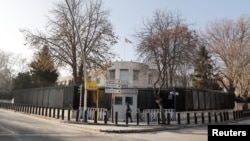Turkey is calling for a normalization of relations with the United States following rising diplomatic tensions between the NATO allies.
“Our wish is that relations between the two allies get back to normal soon. We, as Turkey, will not give up on common sense at a time when regional and global tensions have been rising,” said Prime Minister Binali Yildirim in a speech to provincial governors in Ankara.
Relations are deeply strained following the arrest of local U.S. consulate employee Metin Topuz on terrorism and espionage charges in relation to a failed coup last year against President Recep Tayyip Erdogan. Those tensions resulted in both sides severely restricting the issuance of visas.
President Erdogan Tuesday sought to personally blame U.S. Ambassador John Bass for the tensions. Erdogan also declared that the ambassador would no longer be considered Washington’s legitimate representative. Bass is due to leave Turkey later this week for a new assignment in Afghanistan.
Washington has strongly backed Bass’s actions, reiterating its criticism of the detention of its local employee. Observers suggest the move has closed the door to Ankara's hopes of ending the crisis by blaming it on the ambassador, rather than Washington.
Turkish media reports say Turkish Foreign Minister Mevlut Cavusoglu spoke with his U.S. counterpart, Rex Tillerson, by phone Wednesday. No details about the conversation have been released.
Ambassador Bass, speaking to reporters Wednesday, denied local media reports that another employee reportedly being sought by authorities was in hiding at the U.S. diplomatic premises.
Bass reiterated concerns about the detention of its employee.
“When a government takes concrete measures against our local staff and when that government does not provide any visibility about the reasons for doing so, when some people in that government choose to essentially try the guilt or innocence of those people in the media, in the court of public opinion instead of in court of law, that raises concerns for our government,” said Bass.
The U.S. ambassador declined to speculate on what Ankara has to do for Washington to lift the visa restrictions.
“That’s a matter of discussion between the two governments. We can be sure that the Turkish government understands the rationale behind our decision, and we can better understand the rationale behind their decisions, and try to find a way back to regular visa operations,” Bass said.
The leader of Turkey's main opposition Republican People’s Party, Kemal Kilicdaroglu, was critical of Washington’s decision to impose visa restrictions, saying it hurts ordinary citizens, but he also criticized the government in Ankara.
“Now, they are trying to solve the problem with a hostage policy. The hostage policy would only deepen the problem rather than solve it,” Kilicdaroglu warned.
With 11 U.S. citizens currently detained in a post-coup crackdown along with a similar number of German citizens, Berlin is a strong critic of Ankara. Accusations are growing that the Turkish government is using detainees as a bargaining chip.
“It looks as though Turkish officials are now resorting to a type of bargain that is used by mainly rogue states, taking hostage nationals of states it has disagreements with. Some observers point in this direction,” said political scientist Cengiz Aktar. Ankara strongly denies the accusation, maintaining the judiciary is independent.
Bilateral relations have also been soured by disputes over U.S. support for Kurdish fighters in Syria and Turkey's unsuccessful effort to have the U.S. extradite a cleric blamed for the failed coup. Fethullah Gulen, who lives in self-imposed exile in the U.S., denies any involvement in the attempted coup.
The decision by a Turkish court Tuesday to hand out a jail sentence to Wall Street Journal newspaper journalist Ayla Albayrak on terrorism propaganda charges threatens to further strain bilateral relations. Albayrak, who left Turkey before the verdict, was convicted for an article on the Turkish state's war against a Kurdish insurgency. Albayrak’s conviction has drawn swift political condemnation in the U.S.
“Ms. Albayrak's sentencing adds to a troubling crackdown on the free press by President Erdogan’s government in Turkey, where independent media outlets have been closed and countless journalists have been jailed,” U.S. Senator John McCain said in a press statement.




